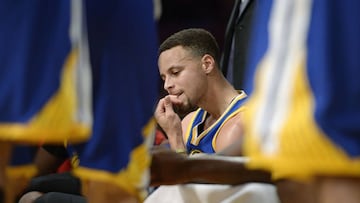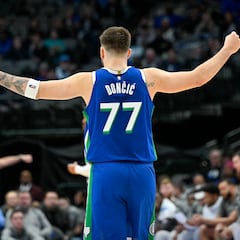What did Warriors star Steph Curry have to say about the ‘load management debate?’
Though practiced in most team sports, it’s never sat well with NBA fans. Most recently, the Warriors star gave his opinion on the controversial topic.


In what has become a rather contentious debate, you’ve got teams trying to protect their players - which is their right - over a long campaign. On the other, you’ve got fans who pay hard earned dollars to watch their favorite stars play. Who’s right and who’s wrong? While that’s a tough nut to crack, there’s got to be a middle ground.
Steph Curry weighs in on the ‘Load Management’ debate
On Monday night, the Golden State Warriors defeated the Oklahoma City Thunder by a score of 128-120. A major part of that victory lay in the hands of Golden State’s talisman, Steph Curry. With his 38 points, eight rebounds and 12 assists, Curry was absolutely immense. Yet, it’s got to be said that just over a month ago, there were doubts as to exactly when and how much Curry would play, following a shoulder injury. The fact that Curry now appears to be back to his best in a short period of time, is largely down to the careful management of his minutes on the court as he recovered. This of course brings us to the debate of load management, which is essentially the management of how many minutes a player spends on the court. With that in mind, Curry’s opinion on the matter was an interesting take.
The Warriors have a Minnesota, Denver back-to-back coming up.
— Anthony Slater (@anthonyVslater) January 31, 2023
Steph Curry: "I campaign to play every game. That's the misconception about load management. It's never the player saying, 'Hey, I want to sit.'"
Does he anticipate being successful?
"I do, actually. I do." pic.twitter.com/8GwJNuSQyY
“I campaign to play every game,” Curry said. “That’s the misconception about load management and how it goes. It’s never the player that’s saying, ‘Hey, I want to sit.’ For all those people worried about that part of our league and all that, it’s usually not the player that’s going to the training staff and saying, ‘Hey, I don’t have it tonight.’ It’s usually the other way around and there’s a lot of science involved.” For the sake of context, it’s important that you understand that just earlier this month, both Curry and the Warriors came under fire when the decision was taken to rest him following the aforementioned injury. What’s more, is that Draymond Green, Klay Thompson and Andrew Wiggins were all rested during that period as well - specifically against the Cavs - which led head coach Steve Kerr to allude to the “brutal part of the business,” before suggesting that the season be reduced to 72 games.
Is Load Management ruining the NBA?
Related stories
While there is often a tendency to make things seem worse than they are, it has to be said that a number of games - this month in particular - have been adversely affected by stars being sidelined due to injury, or the team deciding to rest them. Needless to say, the debate has kicked off each and every time whether it was a missed opportunity to see Giannis vs Jokic, or Durant vs James. This of course, is what makes Curry’s comments interesting. Typically, it’s the players who are accused of opting out. Indeed, through his perspective, we’ve been able to see that it’s not simply a case of a player picking up a check which many have accused them of doing. Instead, it’s a situation where the decision comes from higher up. Ultimately, what player in any sport doesn’t want to be on the court of field playing?
"Make $40M, $50M and rest. These guys act like they're steel mill workers."
— Duane Rankin (@DuaneRankin) January 28, 2023
Charles Barkley #NBA load management.
"We flew commercial. These guys got private planes, they've got the best nutrition, they've got the best doctors, they make $50M and they can't play 4 days a week" pic.twitter.com/7J9er6RxOK
There is also another layer here, which is the length and demands of the season itself. As things stand, rest breaks are designated ahead of time by the franchise in accordance with the advice of their medical departments. That’s to say, these decisions are based in science and not taken lightly. Moreover, they are allocated in a strategic effort to get the best out of each and every player on the roster. What would the alternative be, play them until they are exhausted, or worse, severely injured? At any rate, it’s unlikely we will see something as monumental as the shortening of the season in the near future. So, for the moment here we are, but it’s worth remembering Curry’s point about always wanting to play.

